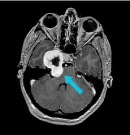Acoustic Neuroma Treatments and Surgical Options
The UPMC Acoustic Neuroma Center offers a wide array of treatment options for acoustic neuromas. Our multidisciplinary team of neurosurgeons and neurotologists works together to offer each patient a personalized treatment plan. Treatment for acoustic neuroma depends on your age and general health, as well as the tumor's size, location, and rate of growth.
If the tumor is very small and you have no serious symptoms, the doctor may decide simply to monitor its growth. This conservative route is common among people over age 70.
If the patient is experiencing more serious symptoms, surgery may be recommended by the doctor.
Microsurgery
As the acoustic neuroma grows, or if hearing becomes impaired, removal of all or part of the tumor may be necessary.
The surgical approach depends on the size and location of the tumor.
Microsurgical approaches for acoustic neuromas, all available at the UPMC Acoustic Neuroma Center, include:
- Retrosigmoid approach
- Translabyrinth approach
- Middle fossa approach
- Endoscopic-assisted retromastoid approach
In all cases, we perform neurophysiological monitoring of cranial nerves, especially the seventh cranial nerve (facial nerve).
The experts at the UPMC Acoustic Neuroma Center may recommend a combination of surgical and non-surgical treatments to treat your acoustic neuroma. Our goal is to maximize the benefits of surgery, while minimizing risks.
Gamma Knife® radiosurgery
Gamma Knife radiosurgery is a painless procedure that uses hundreds of highly focused radiation beams to target tumors and lesions within the brain, with no surgical incision.
Gamma Knife may be the first treatment option for an acoustic neuroma, particularly in cases where the tumor is not causing mass effect.
Gamma Knife may be used as an additional treatment after partial surgical removal for large acoustic neuromas. UPMC doctors use this treatment to prevent further growth of the tumor and maintain current neurological and hearing functions.
As the nation's leading provider of Gamma Knife procedures, UPMC has treated more than 15,000 patients with brain tumors, vascular malformations, pain, and other functional problems.


















